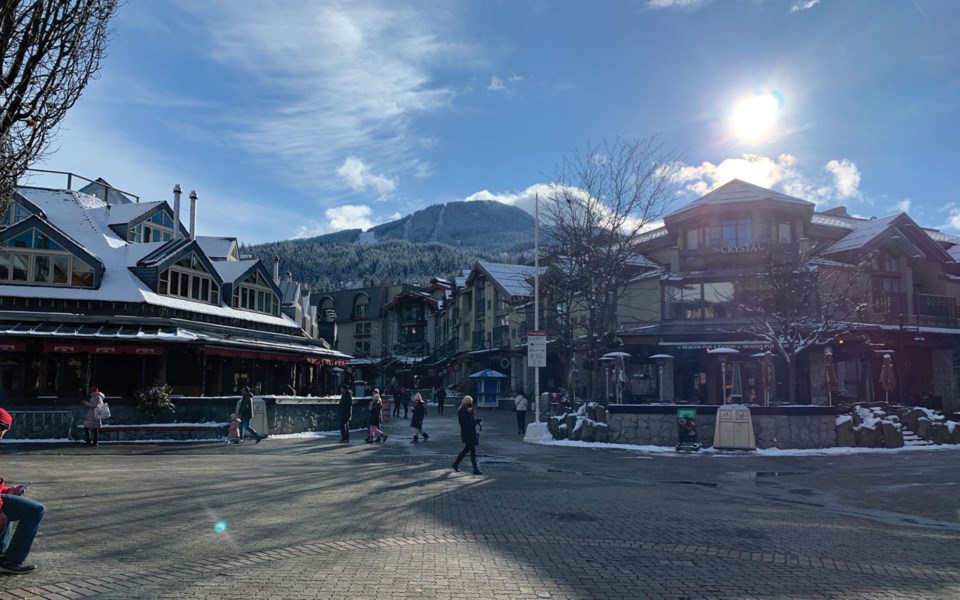While the Resort Municipality of Whistler (RMOW) is hopeful new measures—like waiving fees for patios and adding outdoor dining spaces—will help food and beverage operators, the sector continues to struggle with costs associated with temporary structures, according to municipal staff.
“All I can say is that there are no easy solutions,” said manager of planning Melissa Laidlaw, at the Nov. 3 council meeting.
“I was talking to one restaurant operator who [said] they’re really nervous to spend any money with COVID cases going up. They’re fearful of more restrictions, so some restaurants are looking at how to optimize their indoor seating, with the use of the physical barriers.”
And while temporary outdoor patios are now permitted through Oct. 31, 2021, the RMOW is still working out how to ensure temporary structures don’t become permanent.
On Nov. 3, council directed staff to prepare amendments to its business and regulation bylaw to address the concern.
With respect to temporary structures, all buildings larger than 10 square metres in footprint area would require a building permit, which includes an engineering review, Laidlaw noted in a presentation to council.
But for those smaller than that, an engineering review would only be needed if the structure is on municipal property, Whistler Village Land Co. property, or right of way granted to the municipality for public access.
For those structures on municipal property, there is a process “to manage the duration and removal of, the aesthetics, and safety considerations such as snow removal, but there is no such mechanism to address this on private properties,” Laidlaw said.
“So the way to address this is through proposed amendments to the business licence and regulation bylaw.”
Updating the bylaw will require a public process, she added.
RMOW staff is also working to enhance sheltered public seating options this winter, Laidlaw said, including moving picnic tables to covered areas like the Gateway Loop.
To help “expedite the approvals of temporary structures,” staff is developing a pre-approved design prototype, she added.
“We would develop this prototype for our use, but also share this information with the food and beverage sector, in case it is something that they are interested in,” she said.
“This is still under development, and will be shared with the sector as soon as possible.”
Council also gave first readings to bylaws waiving the renewal fees for temporary outdoor patios on Nov. 3 (new applications will still be charged the $240 fee).
Councillor John Grills recused himself from the discussion, noting he owns commercial properties used by food and beverage operators that may apply for patio extensions.
ACCESS TO COUNCIL INFO STREAMLINED
The RMOW is making it easier to access council information through a revamped online interface at whistler.ca/councilmeetings.
Info about council meetings can now be accessed in an interactive format that cues recorded video footage of meetings to relevant agenda items—just click the html link, then your agenda item of choice.
Meeting schedules can also now be viewed in calendar or list format, and users will soon be able to search agendas and meetings by specific topics of interest.
“Council meetings are the primary decision-making avenue for municipal government and it’s important for community members, including second homeowners and seasonal residents, to be involved in this process,” said Mayor Jack Crompton in a release.
“Time and location are no longer barriers to participation. It is easier than ever to watch a meeting from a distance, and learn more about the decisions that affect our day-to-day life.”
NEW GM OF RESORT EXPERIENCE HIRED
The RMOW has a new general manager of resort experience.
Jessie Gresley-Jones, previously section head of development engineering for the City of Vancouver’s major projects, has filled the role left behind by Jan Jansen, who retired in February.
“Jessie brings significant experience in community planning, development planning, urban design and development engineering,” said RMOW chief administrative officer Virginia Cullen, in a release.
“I am very pleased to welcome him to our organization, and look forward to his valuable expertise and leadership.”
Toni Metcalf, who has been serving as interim general manager for resort experience, will resume her role as manager of economic development and tourism recovery once Gresley-Jones joins the organization on Dec. 2.
In his new role, Gresley-Jones will oversee Whistler’s resort and parks planning, village events and animation, cultural planning and development, facility construction management, resort operations and environmental stewardship (while reporting to the chief administrative officer).
While with the City of Vancouver, Gresley-Jones oversaw a large team working across all aspects of development, and was the city’s engineering lead for the new $1.9-billion St. Paul’s Hospital and Oakridge Transit Centre redevelopment, according to the release.
He spent two years working on Vancouver’s Cambie Corridor planning process, which established a vision for approximately nine per cent of the land area of Vancouver.
“The plan enabled significant change over the coming decades and will add over 30,000 new homes and significant new affordable housing and job space,” the release said.
“From March to July of this year, Gresley-Jones was [also] the deputy planning chief for the City of Vancouver’s Emergency Operations Centre COVID-19 response.”
Prior to joining the City of Vancouver, Gresley-Jones worked as a planner for the District of North Vancouver and Hapa Collaborative, a landscape architecture and urban design practice.
He holds a master’s in landscape architecture from the University of Toronto and a bachelor of environmental studies in planning from the University of Waterloo. He is also an urban design lecturer in the Continuing Studies program at Simon Fraser University.




